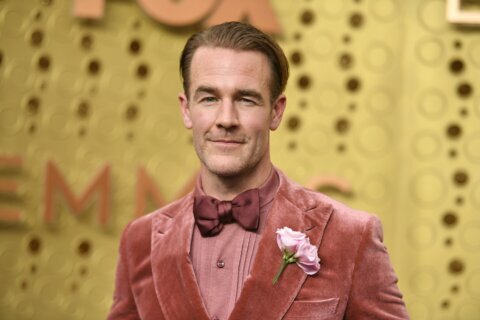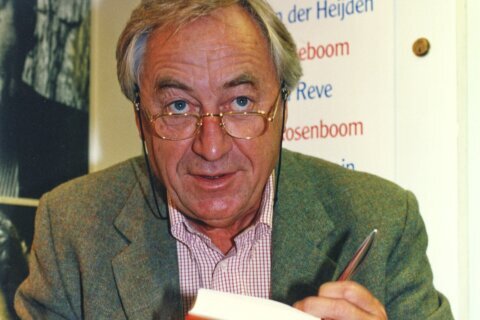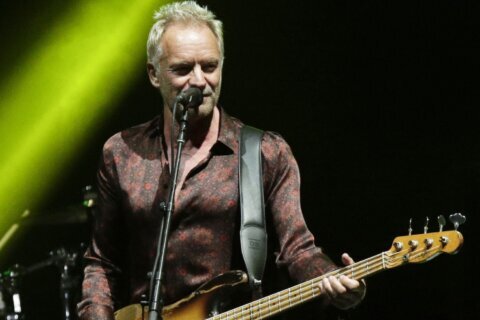WASHINGTON — She’s known to the French simply as “La Binoche,” cinematic royalty as the first to win the “European Triple Crown” of Best Actress at the Berlin, Cannes and Venice film festivals.
But Oscar winning actress Juliette Binoche has never been to Washington D.C. — until now.
“First time in Washington,” Binoche reveals to WTOP. “A lot of concrete, not enough trees!”
The legendary French actress just arrived at the Kennedy Center for a four-night engagement (Oct. 22-25). She’ll perform the title role of “Antigone,” directed by Belgium’s Ivo van Hove and translated by poet Anne Carson from Sophocles’ legendary “Oedipus” trilogy of Greek mythology.
Like many of us, Binoche discovered the mythic tale as required reading in school. But she fell in love with the story all over again upon seeing the play at a Paris theatre as an 18-year-old dreamer.
“I was in the first row, it really printed in my mind,” Binoche says. “With Ivo van Hove, the director, we talked about plays and Greek tragedies. He went more with Medea and Electra, and I stuck to Antigone because I remember it being so strong.”
In case you’re fuzzy about the iconic story, here’s a quick refresher. Antigone is the daughter of Oedipus, who unwittingly killed his father and married his mother (i.e. the “Oedipus Complex”).
“Oedipus was rejected by his parents because they went to see The Oracle in Delphi, who told them, ‘You will kill your father and marry your mother.’ The parents were so frightened by that possibility, they put him in the woods and he was found and raised raised by the King and Queen,” Binoche explains.
Restless to discover his roots, Oedipus goes to The Oracle and learns of the prediction. Frightened, he leaves his adopted parents, only to cross paths with his father, whose carriage runs over his foot.
“‘Oedipus means ‘swollen foot.’ It was his father that was in this carriage and he killed him,” Binoche recalls. “He went to Thebes because he heard that the (stranger’s) widow was willing to marry anybody who could answer the Sphinx question. The Sphinx asked, ‘Who in the morning is on four feet, two feet in the mid-day and three feet in the evening?’ Oedipus answers ‘the human being.'”
Oedipus’ correct answer to this question wins The Queen’s hand in marriage, though he doesn’t know it’s actually his mother — fulfilling the cursed destiny. While everyone knows the concept of the “Oedipus Complex,” Binoche says the real key is understanding the Sphinx’s mysterious riddle.
“The Sphinx question about the ‘four in the morning’ … when we start our lives, we have this animal nature. We’re going through emotions: jealousy, pride, our needs are very raw, so it’s all the animal side (four legs) that we have to somehow be aware of and to transform into the two (legs), which is the human being. When you’re becoming less of an animal but more into reaching your spiritual nature, which in the evening, ‘the three’ is actually the trinity. In all (divine) traditions, trinity is the spirit … it’s the spiritual journey, you have that in Taosim, you have that in Sophism. …. Myths are combining so many layers of our unconscious. It’s teaching about our possible transformation, that’s why it’s fascinating to go back to the myths and the old writers’ minds and masters.”
By the time of “Antigone,” the third chapter of the trilogy, Antigone is trying to repair the damage of her family history. In this chapter, her dead brother is decreed a traitor and his body is left unburied beyond the city walls. Antigone refuses to accept this punishment and defies her governor uncle by forging ahead with a funeral alone, placing personal allegiance before politics.
“The curse is so big on this family,” Binoche says. “What she’s trying to repair is to go back to that curse and transform it. … As (King) Creon is trying to push it away, she is willing to go and take it from the root to reverse this situation. … ‘Antigone’ means ‘before birth,’ so she’s really a symbol in this beautiful myth of Oedipus, she’s the symbol of going back to the principle.”
This is her last time playing the role after nearly 100 shows, from Europe to Brooklyn, North Carolina to Michigan. it all ends here in Washington, D.C. with Saturday’s show marking performance No. 100.
“For us, symbolically it’s very powerful,” Binoche says. “Every night is a challenge. It needs to be at its peak to be really at its power. Just before plunging into it is sometimes very difficult, so I’m happy to move on and go onto another thing. But while I’m at it, I’m enjoying it, because you reveal the inside of what we’re made of. Antigone is going through so many different layers of herself emotionally.”
What’s next for Binoche? She’s got a number of films on the horizon, including the American-Chilean production “The 33” (2015) and the Italian-French production “The Wait” (2015) making the rounds this year, as well as two upcoming French films next year: “Slack Bay” (2016) and “Paulina” (2016).
In this cinematic light, WTOP wrapped the interview with a rapid-fire session, asking Binoche for a one-word response to some of her biggest roles and her experience with her most stellar directors:
1) Jean-Luc Godard – “Hail Mary” (1985)
Faith.
This early role helped put Binoche on the map by working with French New Wave legend Godard.
2) Philip Kaufman – “The Unbearable Lightness of Being” (1988)
Joy.
The director of “The Right Stuff” followed up with this romance between Binoche and Daniel Day-Lewis.
3) Krzysztof Kieślowski – “Three Colors Trilogy” (1993-1994)
Complicity.
Binoche turned down Steven Spielberg’s “Jurassic Park” to appear in “Three Colors: Blue, Red, White.”
4) Anthony Minghella – “The English Patient” (1996)
Surprise.
The role won a Supporting Actress Oscar and Best Actress at both the Venice Film Fest and Berlin Film Fest.
5) Lasse Hallström – “Chocolat” (2000)
Yummy.
The role earned Binoche another Oscar nomination and won her the European Film Award for Best Actress.
6) Michael Haneke – “Cache” (2005)
Dangerous.
This thriller is a masterpiece by Haneke, who won the Palme d’Or twice (“Amour” and “The White Ribbon”).
7) Abbas Kiarostami – “Certified Copy” (2010)
Deep.
The role won Binoche the Best Actress award at the Cannes Film Festival.
8) Gareth Edwards – “Godzilla” (2014)
Short!
Binoche had very minimal screentime across Bryan Cranston in this Hollywood blockbuster remake.








